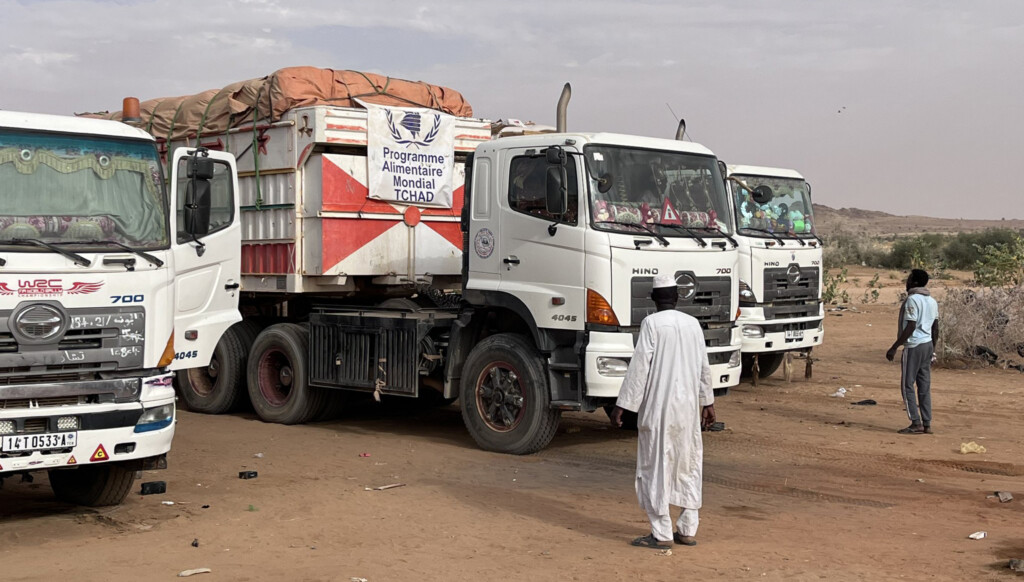Sudan humanitarian response: WFP lauds new EU pledge of €302 mln

UN World Food Programme aid convoy for Darfur, April 2024 (File photo: WFP)
The UN World Food Programme (WFP) has lauded a new pledge by the European Union (EU) of €117 million for the humanitarian response in Sudan, as well as an additional €185 million to respond to the impact of the crisis in neighbouring countries, as the UN food agency works to scale up its operations to avert a humanitarian catastrophe.
In a statement today, WFP Sudan Country Director and Representative Eddie Rowe, says: “Amid escalating conflict and rising hunger, sufficient funding is critical to meet increasing humanitarian needs. We are extremely grateful to the EU for their contribution, which helped us save lives during this crisis.”
WFP says that with the support of the EU, it has been able to provide emergency food assistance to nearly 6.4 million people, of which around 550,000 people received cash, since the conflict erupted in Sudan just over one year ago.
“This was in part made possible with a EUR €28 million contribution from the EU Humanitarian Aid Operations (ECHO) in 2023. The aid agency also used this funding to help treat and prevent malnutrition for 260,000 children and pregnant or nursing women,” the WFP statement says.
‘A record 17.7 million people already face acute food insecurity, while almost five million people are just one step away from starvation…’ – WFP
WFP has been warning that Sudan could become the world’s largest hunger crisis during the upcoming lean season, which starts in May and lasts through October. Currently, during the harvest season, a record 17.7 million people already face acute food insecurity, while almost five million people are just one step away from starvation (IPC 4). The food security situation is expected to worsen even further in the coming months unless urgent action is taken to support those facing the highest levels of hunger.
WFP points out that in 2024, the EU has mobilised an initial amount of EUR €117 million for the humanitarian response in Sudan, as well as an additional EUR €185 million to respond to the impact of the crisis in neighbouring countries. This new amount comes on top of the European Commission’s humanitarian funding for Sudan in 2023, which totalled EUR €128 million.
“As WFP works to scale up its operations to avert the risk of a humanitarian catastrophe, the support of partners such as the EU — one of our most generous partners in Sudan — remains critical to WFP’s efforts,” the statement concludes.
NGOs call on EU for ‘urgent, strategic, and concrete steps’
In the run-up to the International Humanitarian Conference for Sudan in Paris last month, and to mark a year since the outbreak of the conflict, several prominent international human rights organisations, press freedom advocates, and humanitarian organisations, have addressed a joint open letter to the High Representative of the European Union (EU) for Foreign Affairs and Security Policy and Vice-President of the European Commission, Josep Borell Fontelles, as well as the Foreign Affairs Ministers of the EU member states, urging “urgent, strategic, and concrete steps to respond to the massive cost on civilians of the dramatic human rights and humanitarian crisis in the country and prevent further violations”.
In an open letter, jointly signed by Amnesty International; Brot für die Welt (Bread for the World); Cairo Institute for Human Rights Studies; Christian Solidarity Worldwide; Finn Church Aid, Finland, Free Press Unlimited, Front Line Defenders, Human Rights Watch, International Federation for Human Rights, International Service for Human Rights, and Protection International Institute, called on the EU and its member states “to respond to this conflict urgently by engaging with the parties to the conflict and their regional supporters to stop all attacks on civilians and civilian infrastructure, and to end the deliberate obstruction of relief”.
€896 million
A statement by the European Commission on April 14, following the International Humanitarian Conference for Sudan in Paris last month, points out that the European Commission has committed €355 million in both humanitarian and development funding for Sudan and its neighbours. Together with the pledge from EU States of €541 million, total EU support to Sudan pledged at the conference amounts to €896 million.
‘The one-year conflict in Sudan has created a catastrophic humanitarian situation. With half of the total population of the country at risk of starvation, the window to avoid the worst is quickly closing…’ – High Representative of the EU for Foreign Affairs, Josep Borell Fontelles
The European Commission’s funding will be channelled via humanitarian organisations to the most vulnerable in need suffering from consequences of the conflict in Sudan itself, but also those who have sought refuge in neighbouring countries. EU aid will provide communities with health and nutritional care, food assistance, water and sanitation, shelter, protection, and education to the most vulnerable households – internally displaced, refugee families and host communities.
At the time, the High Representative of the EU for Foreign Affairs, Josep Borell Fontelles, acknowledged: “The one-year conflict in Sudan has created a catastrophic humanitarian situation. With half of the total population of the country at risk of starvation, the window to avoid the worst is quickly closing…”
“With today’s pledge of €896 million, the EU shows its determination to stand by the Sudanese people. Our priority continues to be the implementation of a ceasefire and the passage of humanitarian aid.
“The principle of accountability must be applied, also through the application of sanctions. We must strengthen coordination, including when it comes to mediation. And we need to continue to support civil society representatives so they can contribute to shape the peace process. The resolution of this conflict must be a priority for the international community, even in a global context marked by multiple crises.”
‘Time running out’
In a statement on 3 May, WFP warns that “time is running out to prevent starvation in Darfur as intensifying clashes in North Darfur’s capital El Fasher hinder efforts to deliver vital food assistance into the region.
‘Civilians in Darfur are already facing devastating levels of hunger, yet deliveries of food assistance have been intermittent due to fighting and endless bureaucratic hurdles…’ – WFP
Civilians in El Fasher and the wider Darfur region are already facing devastating levels of hunger, yet deliveries of food assistance have been intermittent due to fighting and endless bureaucratic hurdles. The latest escalation of violence around El Fasher has halted aid convoys coming from Chad’s Tine border crossing – a recently opened humanitarian corridor that passes through North Darfur’s capital.
Meanwhile, restrictions from the authorities in Port Sudan are preventing WFP from transporting assistance via Adré, the only other viable cross-border corridor from Chad. The route can serve West Darfur and other locations in Central, South and East Darfur. These access constraints are jeopardizing WFP’s plans to provide vital assistance to over 700,000 people ahead of the rainy season when many roads across Darfur become impassable.
‘WFP urgently requires unrestricted access and security guarantees to deliver assistance to the families struggling for survival amid devastating levels of violence…’ – Michael Dunford, WFP’s Regional Director for Eastern Africa
“Our calls for humanitarian access to conflict hotspots in Sudan have never been more critical: WFP urgently requires unrestricted access and security guarantees to deliver assistance to the families struggling for survival amid devastating levels of violence. We must be able to use the Adré border crossing and move assistance across frontlines from Port Sudan so we can reach people throughout the Darfur region,” said Michael Dunford, WFP’s Regional Director for Eastern Africa.
WFP says that the recent surge in violence in El Fasher is exacerbating critical humanitarian needs in Darfur, where at least 1.7 million people are already experiencing emergency levels of hunger (IPC4). El Fasher had been a relative safe haven for families, hosting many IDP camps that pre-date the current conflict. Yet conditions were already critical with reports of children dying of malnutrition.
Now many are being forced to flee El Fasher and surrounding areas – some for the second or third time – and are becoming increasingly vulnerable. On top of the impact of the escalating violence, WFP is concerned that hunger will increase dramatically as the lean season between harvests sets in and people run out of food.
“The situation is dire. People are resorting to consuming grass and peanut shells. If assistance doesn’t reach them soon, we risk witnessing widespread starvation and death in Darfur and across other conflict-affected areas in Sudan,” said Dunford.
Over the last six weeks, WFP has delivered emergency food and nutrition assistance to over 300,000 people in North, West, and Central Darfur using the Tine and Adré border crossings and a crossline route from Port Sudan. These breakthroughs followed lengthy negotiations. But the progress appears to have been short-lived with all routes now blocked. WFP and the rest of the humanitarian community needs to be able to deliver humanitarian assistance consistently and at scale to prevent a worsening of the crisis, WFP stresses.











 and then
and then